英语七年级(上册)第八课第一课时
人教版七年级英语上册教学课件:Unit 8 When is your birthday(共43张PPT)
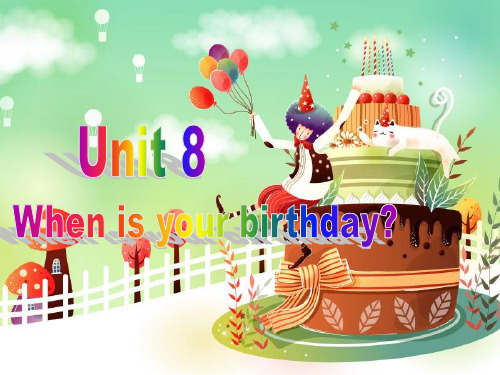
5月24日
9月29日
May twenty-fourth (24th)
September twenty-ninth (29th)
A: When is your birthday? B: My birthday is March 7th.
A:When is your birthday?
B:My birthday is… / It is …
Make a survey (调查)
When is your birthday, Mary? My birthday is November 15th .
Names Mary Month November Date 15th
Report:
Mary’s birthday is November 15th … …
3
A:When is your birthday, Linda? B:My birthday is .
A:When is your mother’s birthday?
B:Her birthday is . A:When is your father’s birthday? B:His birthday is .
Bill: Hi, Alan. Happy birthday! Alan: Thank you, Bill. Bill: So, how old are you ,Alan? Alan: I’m twelve. How old are you ? Bill: I’m thirteen. Alan: When is your birthday ? Bill: My birthday is in August. Alan: Well ,do you want to come to my birthday party ? Bill: Oh ,yes. When is it ? Alan: At three this afternoon. Bill: OK, great .See you !
人教版英语七年级(上册)Unit 8 Section A (1a-2c)教案设计
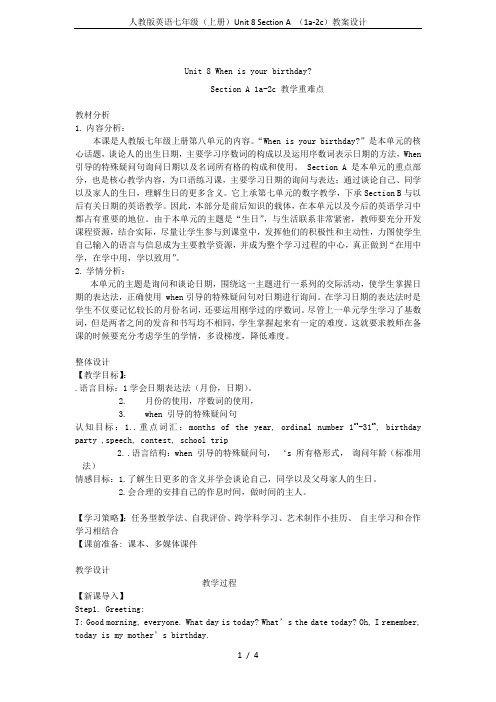
Unit 8 When is your birthday?Section A 1a-2c 教学重难点教材分析1.内容分析:本课是人教版七年级上册第八单元的内容。
“When is your birthday?”是本单元的核心话题,谈论人的出生日期,主要学习序数词的构成以及运用序数词表示日期的方法,When 引导的特殊疑问句询问日期以及名词所有格的构成和使用。
Section A是本单元的重点部分,也是核心教学内容,为口语练习课,主要学习日期的询问与表达;通过谈论自己、同学以及家人的生日,理解生日的更多含义。
它上承第七单元的数字教学,下承Section B与以后有关日期的英语教学。
因此,本部分是前后知识的载体,在本单元以及今后的英语学习中都占有重要的地位。
由于本单元的主题是“生日”,与生活联系非常紧密,教师要充分开发课程资源,结合实际,尽量让学生参与到课堂中,发挥他们的积极性和主动性,力图使学生自己输入的语言与信息成为主要教学资源,并成为整个学习过程的中心,真正做到“在用中学,在学中用,学以致用”。
2.学情分析:本单元的主题是询问和谈论日期,围绕这一主题进行一系列的交际活动,使学生掌握日期的表达法,正确使用 when引导的特殊疑问句对日期进行询问。
在学习日期的表达法时是学生不仅要记忆较长的月份名词,还要运用刚学过的序数词。
尽管上一单元学生学习了基数词,但是两者之间的发音和书写均不相同,学生掌握起来有一定的难度。
这就要求教师在备课的时候要充分考虑学生的学情,多设梯度,降低难度。
整体设计【教学目标】:.语言目标:1学会日期表达法(月份,日期)。
2.月份的使用,序数词的使用,3.when 引导的特殊疑问句认知目标:1..重点词汇:months of the year, ordinal number 1st-31st, birthday party ,speech, contest, school trip2..语言结构:when 引导的特殊疑问句,‘s 所有格形式,询问年龄(标准用法)情感目标:1.了解生日更多的含义并学会谈论自己,同学以及父母家人的生日。
人教版七年级英语上册 Unit 8 When is your birthday

Unit 8 When is your birthday ?第一课时Section A(1a~2e)Step 3完成教材2a-2e 的任务请读一读2a方框中的序数词,再听录音纠正自己的发音,然后跟着录音读三遍,再自己读记这些单词。
(3分钟)2.叫三、四个同学读一读。
(2分钟)3.请听录音,看2a并圈出你听到的序数词,完成2b的任务。
(2分钟)4.让若干学生说出自己的答案,然后再播放一遍录并核对答案。
(2分钟〉5.请认真听录音,将录音中出现的姓名、对应的出生月份和日期连起来,完成2c的任务。
(2分钟)6.再播放一遍2c的录音,核对答案。
(2分钟)7.请先看2c,再和同伴结对练习,谈谈2c中人物的生日,然后询问彼此家人的生日,完成2d的任务。
(3分钟)参考案例A:When is Alice s birthday?B:Her birthday is on September 5th.A:When is Frank s birthday?B:His birthday is on…A:When is your father s birthday?B:His birthday is on ...A:…B:…8.大声朗读2e的对话,读熟后与同伴结对练习,分角色表演对话。
(4分钟)9.邀请三组同学上台表演。
(3分钟)环节说明:通过听、说、读、写的训练,让学生掌握了谈论日期这一目标语言,可以提高学生的综合能力。
Step 4小结训练:(5分钟)(见多媒体)一、根据汉语完成句子,每空一词。
1.—你妈妈的生日是什么时候?—她的生日是十月八日。
—When is your mother’s birthday?—Her birthday is on October 8th.2.—祝你生日快乐!—谢谢。
—Happy birthday to you!第二课时Section A (3a~3c)Step 3完成教材3b-3c 的任务1.请认真读3b的对话,把它补充完整,然后再与同伴结对练习该对话。
Unit8SectionA(1a-2d)课件人教版七年级英语上册

THANK YOU
1.1~12月份的表达;序数词1~31、 变化规律及缩写;
2.英文日期表达法:月份+序数词 简写 December 5th;
3.When is your birthday?My birthday is .…/It's …
When is his/her/Alice's birthday? His/her birthday is .…/It's …
整十的要注意,变y为i再加e,th最后加上去,(twenty twentieth,thirty thirtieth)
若表示第几十几,只变个位就可以。
(twenty-one twenty-first;twad out the dates!
Pair Work
I can add..
My birthday is on December 5th 读作:December the fifth
Homework
1.Copy the months twice each and recite
them.
(抄写12个月份两遍并背诵。) a survey about classmates' birthday in your class.Make a conversation in your exercise book. (调查同学的生日,写出对话。)
A:When is your birthday,Mary? B: It's on January 5th.
A:When is your birthday,Mike? B: My birthday is on June 3rd.
基数词 序数词 缩写 基数词
序数词
缩写
Unit8 重点知识复习课件 人教版英语七年级上册(1)(1)

语法知识精讲
③第一百以上的多位序数词 将个位基数词变为序数词。例如: one hundred and twenty-first 第一百二十一,one thousand three hundred and twentieth 第一千三百二十。 ④序数词的缩写形式 有时,序数词可以用缩写形式来表示。缩写形式由“阿拉伯数字 + 序数词形式末 尾两个字母”表示,例如:first—lst, second—2nd,third—3rd,fourth—4th, sixth—6th,twentieth—20th,twenty-third—23rd。其中lst,2nd,3rd为特殊形式,其 它的都是阿拉伯数字后加上th。 (2)序数词的用法: ①序数词前一般要加定冠词the表示顺序。
单词和短语精讲
1. 月份单词的书写。
主要注意月份是专有名词,首字母要大写。月份可以用缩写的方式,用前三个字母加
一个点表示。
一月 Jan. January 二月 Feb. February 三月 Mar. March 四月 Apr. April
五月 May. May 六月 Jun. June 七月 Jul. July
背一背
trip /trip/ n. 旅游;旅行 art /a:t/ n. 艺术;美术 festival /'festivl/ n. (音乐、戏剧等的)节;节日 dear /diə/ adj. 亲爱的 student /'stju:dnt/ n. 学生 thing /θiŋ/ n. 东西;事情 term /tə:m/ n. 学期 busy /'bizi/ adj. 忙碌的;无暇的 time /taim/ n. 时间 Have a good time! (表示祝愿) 过得愉快
冀教版七年级英语上册Lesson8 课件
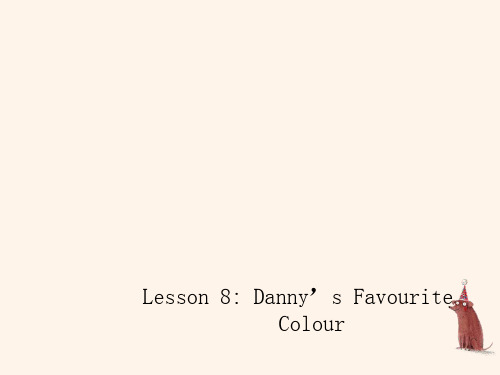
一、单项选择
1.—___A_____people travel every year?
—Perhaps when we are talking about it, more than
100 planes have taken off around the world.
8.How many c_l_a__s_s_e_s_(class) do you have at school? 9.I buy crayontso________(paint). 10.How about _mp_ia_xi_in_nt_g__(mix) these colours?
本节课主要学习了以下重点内容: (1)重点单词:want, paint, make, look等。 (2)重点短语:mix…and…, in the sky等。 (3)重点句式:I don’t like red. How about…?
3.MiHxowbltuoemaankde ygerleleonw?.
I am a rainbow. Look at me.
How many colors do you see?
I am red, orange and blue.
I am green, yellow and purple, too.
want之后加动词不 the park
定式to do表示想 tomorrow.我想明
做某事。
天去公园。
want sb. to do I want Jenny to
sth.想让某人做某 go with me.我想
事。
让詹妮和我一起
人教版七年级上册英语Unit 8 SectionA (1a-2e)授课课件

考点精讲
②January
考点2 January/dʒænjuəri/,/dʒænjueri/n. 一月 e.g. Januaryisthefirstmonthofayear. 一月是一年中的第一个月。
温馨提示: January等表示 月份的单词前面 不可接任何冠词。
Therearethirty-onedaysinJanuary. 一月有三十一天。
巧记十二个月份: 一月(January)、二月(February) 迎春节; 三(March)、四(April)、五(May) 月天气暖。 六(June)、七(July)、八(August) 月多炎热; 金九(September)、银十(October) 好凉快。 十一(November)、十二(December) 天地冻; 寒来暑往又一年。
课文呈现
1c. Practicetheconversationsabovewithyourpartner. Thenmakeyourownconversations.
课文呈现
1st 2n 3rd 4th 5th 6th 7th 8th
10t 11t
d
9th h h
12t 13t 14t 15t 16t 17t 18t 19t 20t 21s 22n hhhhhhhhht d
e
7.July8.August9.September
10.October11.November
12.December
课文呈现
—Whenisyourbirthday,Mike? —MybirthdayisonJune3rd. ③ —Whenisyourbirthday, Linda? —MybirthdayisonMay2nd. —Whenisyourbirthday, Mary? —It'sonJanuary5th.
七年级上册英语第八课课文
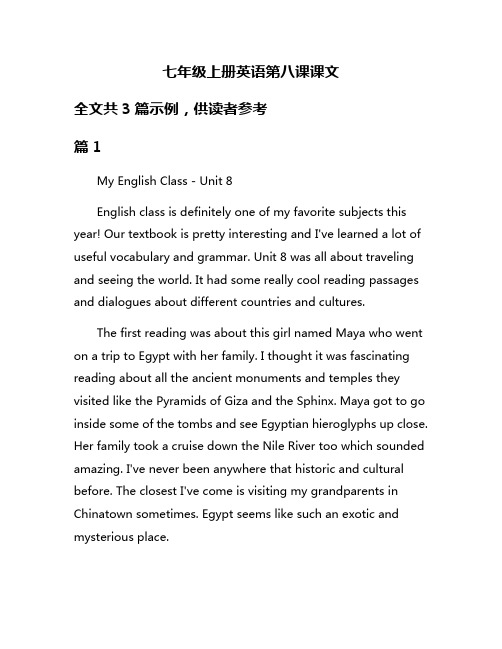
七年级上册英语第八课课文全文共3篇示例,供读者参考篇1My English Class - Unit 8English class is definitely one of my favorite subjects this year! Our textbook is pretty interesting and I've learned a lot of useful vocabulary and grammar. Unit 8 was all about traveling and seeing the world. It had some really cool reading passages and dialogues about different countries and cultures.The first reading was about this girl named Maya who went on a trip to Egypt with her family. I thought it was fascinating reading about all the ancient monuments and temples they visited like the Pyramids of Giza and the Sphinx. Maya got to go inside some of the tombs and see Egyptian hieroglyphs up close. Her family took a cruise down the Nile River too which sounded amazing. I've never been anywhere that historic and cultural before. The closest I've come is visiting my grandparents in Chinatown sometimes. Egypt seems like such an exotic and mysterious place.After the reading there were some comprehension questions that helped me understand what I read better. Like why was the Sphinx's nose missing? Apparently it was from a cannon attack a long time ago by Napoleon's troops. Crazy to think about ancient relics getting damaged like that in warfare. The exercises also had us learn vocabulary words like "excavate", "mummy", and "dynasty." Now I know a dynasty is a line of rulers from the same family which will be useful for history class too.The second part of the unit had a dialogue between two friends, Anna and Liam, who were chatting online. Anna was getting ready for a class trip to Japan and Liam was helping her prepare. I loved learning about Japanese culture and customs through their conversation. Like how it's polite to take off your shoes when entering homes and some restaurants. And using proper titles like "-san" when addressing people. Simple things we don't really think about in the West.My favorite part was Anna and Liam discussing the highlights she wanted to see on her trip. Things like the famous cherry blossom festivals, watching a Sumo wrestling match, going to an anime studio, and eating authentic Japanese cuisine. Anna was so excited to try different foods like ramen, sushi, and the amazing-sounding Japanese beef called Kobe. Makes mymouth water just thinking about it! I'll definitely have to put Japan on my travel wishlist.There was a fun activity after the reading where we had to plan an imaginary trip for ourselves. I chose to "visit" New Zealand because of how beautiful the countryside looked in the pictures. I mapped out all the places I would want to go like Milford Sound, the alpine town of Queenstown, and a dark sky reserve for amazing stargazing. For accommodations I found some cool hobbits-style houses to stay in themed after the Lord of the Rings movies. A working vacation at a sheep farm sounded fun too, aww think of all the baby lambs! My dream New Zealand itinerary is pretty epic if I do say so myself.One of the grammar points this unit covered was the future tense, which worked out perfectly with the travel theme. We learned how to properly construct sentences like "I am going to visit Thailand next summer" or "Maya will be excavating ruins in the future." These are constructions I know I'll use a ton whenever I'm lucky enough to embark on my own adventures abroad. We also went over asking questions in the future tense like "Where are you going to go for your trip?" and "What will you do there?" Really comes in handy when making travel plans and recommendations.Overall, Unit 8 was a really immersive experience into other lands and societies. It definitely sparked my passion for seeing the world even more. Reading about Maya's Egyptian odyssey, Anna preparing for Japan, and researching my New Zealand excursion gave me such a strong case of wanderlust. There's seriously so much culture and history out there to experience firsthand. I can't wait until I'm older and have the chance to embark on my own epic global journeys and make memories that will last a lifetime. But for now, I'll have to be content with living vicariously through the textbook and ones I read for fun. I'm sure more travel units await in future chapters too. Wherever Unit 9 takes me, I'll be ready!篇2Unit 8: Festivals Around the WorldHey guys! I'm super excited to tell you all about the really cool unit we just started in English class. It's called "Festivals Around the World" and I think it's going to be awesome learning about all the different celebrations and traditions from different cultures.We kicked things off by reading this really interesting article about the Spring Festival, which is the biggest holiday in China. Ihad heard of Chinese New Year before, but I had no idea how amazing and important it is! The article said it has been celebrated for over 4,000 years - can you even imagine?! That's crazy old.Apparently, the Spring Festival lasts for 15 days and it's all about bringing families together, honoring ancestors, and ringing in the new year with good luck and prosperity. On New Year's Eve, families get together for this huge feast called a reunion dinner. It sounds just like our big Christmas dinners, but even more extravagant with all kinds of symbolic foods like dumplings, noodles, and fish.After dinner, kids are allowed to stay up late and set off firecrackers and fireworks to scare away evil spirits. I wish we got to do that for New Year's instead of just watching them on TV! The firecrackers are supposed to bring good luck and a fresh start for the new year. People also put up red decorations and give out red envelopes with money as gifts, because red is considered a lucky color.On New Year's Day, the celebrations continue with lion and dragon dances performed by people in these bright, ornate costumes. The dances are supposed to bring good fortune andscare off any more evil spirits that are lingering around. I'd love to see one of those festival dances in person someday!The article said that for the next two weeks, people visit friends and family, watch traditional performances, eat lots of special foods, and just generally have a great time celebrating the Spring Festival and new beginnings. It sounds like such an awesome, festive couple of weeks full of amazing cultural traditions.In class, we also learned about some other huge festivals around the world like Diwali, Day of the Dead, Carnival in Brazil, and more. They all have their own unique customs, foods, activities, and special meanings.Diwali is the Hindu festival of lights that gets celebrated mainly in India, but also by Hindu communities everywhere. During Diwali, houses get decorated with oil lamps and colorful designs made from colored powder. Families light firecrackers (again with the firecrackers!), make delicious sweets, and watch firework shows. It symbolizes the victory of light over darkness, knowledge over ignorance. Doesn't that sound beautiful?Day of the Dead is a Mexican holiday where families welcome back the souls of deceased relatives for a big reunion. They set up colorful altars with photos, flowers, candles, andfavorite foods and drinks of their late loved ones. Some people even go to cemeteries to decorate gravesites and have picnics there! At first that sounded kind of creepy to me, but the more I learned about it the more I can appreciate how it's a positive way to celebrate the lives of those who passed away.Then there's Carnival in Brazil, which takes place right before Lent and is basically one big, massive party! People dress up in crazy costumes and masks, dance in the streets, and have huge colorful parades. The biggest ones are in Rio de Janeiro, with these incredibly elaborate floats and samba dancers in jeweled costumes. It looks like such a vibrant, high-energy celebration of music, dancing, and letting loose before Lent starts.I could go on and on about all the interesting festivals we learned about, but I don't want this to get too long and boring! The main thing is, it's been really fascinating discovering all these different cultural traditions and the unique ways people across the globe honor their heritage and ring in the new year.I think festivals and celebrations are so important for bringing people together, keeping traditions alive, and just letting loose and having fun. They allow us to take a break from our regular routines and experience something special as a community. Whether it's gathering for feasts, enjoying musicand dance performances, or symbolic rituals - these events create shared experiences that bind us closer to our families, cultures, and each other as human beings.I know I'm just a 7th grader, but learning about world festivals has really opened my eyes to all the amazing diversity out there. It makes me want to travel someday and experience some of these celebrations for myself. But even if I can't, I have a deeper appreciation for the colorful tapestry of traditions that make up our world's rich cultural fabric. Studying this unit has been eye-opening, enriching, and made me excited to keep exploring all our world has to offer.篇3Unit 8: A Nice Snack for My Little FriendHey there! It's me again, your friendly neighborhood 7th grader. Today I want to tell you all about the super cool story we read in English class from our textbook. It was the 8th unit and the story was called "A Nice Snack for My Little Friend." I thought it was such an awesome tale, I just had to share the details with you!So the story starts off with this kid named Tom. Tom is a pretty regular dude, just living his life, going to school, playingvideo games, the usual. But Tom has this really neat hobby - he loves taking care of a tiny little bird that lives right outside his bedroom window! The bird is seriously minuscule, like no bigger than his thumb. It's the cutest, most adorable thing ever.Every single day after school, Tom makes sure to put out some bird seed on his windowsill for his little feathered buddy to munch on. He gets such a kick out of watching the bird flutter over and nibble away at the seeds. It's his favorite part of the day, no doubt about it. The bird seems to really appreciate the snacks too, chirping away merrily.Well, one day Tom has this brilliant idea. He decides, "Hey, why don't I try making a special treat for my little pal, something aside from the boring old bird seed?" So Tom gets to work in the kitchen, whipping up this crazy delicious concoction of breadcrumbs, dried fruit, nuts, and get this - even a little bit of sugar and honey! It's like a gourmet bird bakery up in here.Tom can't wait to set the fancy feast out on the windowsill for his birdie bestie. Sure enough, as soon as he puts the sweet snack mixture down, the little bird comes fluttering over, lands right next to it, and starts happily gobbling it all up. You can tell the bird is absolutely loving this new delicacy. It's chirping up astorm, looking up at Tom with those big sparkling eyes, so grateful for the tasty treat.From then on, Tom makes sure to regularly whip up his special birdie snack bakery creations for his tiny little friend. The two become even better pals through sharing the delicious homemade snacks together. Tom feels awesome that his little buddy appreciates the treats so much. Seeing the bird's happy reaction makes all the work in the kitchen totally worth it.The story has a couple other small details, like Tom's mom questioning what bizarre culinary experimentation he's up to when she sees all the random ingredients out on the counter. And there's a part where Tom's friend Jake comes over, sees the bird snacking away, and thinks it's completely hilarious that Tom has a pet bird on the windowsill that he makes gourmet meals for. But you get the overall gist - it's just a cute, lighthearted story about a boy going the extra mile to make a tasty snack for his cute little bird buddy.I really enjoyed reading this story a lot. Probably because I'm just a major animal lover in general. Anything involving pets and cute critters automatically wins mega points in my book! But I also loved how it highlighted taking good care of our animal friends, even doing little things like Tom did to bring them extrajoy and happiness. The whole thing put a big smile on my face from start to finish.The story also reminded me of when I was younger and my grandpa showed me how to make homemade bird feeders using pinecones, peanut butter, and birdseed. We'd slather the peanut butter all over the pinecones, then roll them in birdseed until they were fully coated. After that, we'd hung them up in trees around his backyard. It was so much fun making the feeders, and I'll never forget how excited I was the first time I saw a bird landing on one of them and munching away. Such a small, simple thing, but it brought me a serious sense of joy and excitement!So yeah, that's my hot take on the deets from Unit 8 of our textbook. A feel-good little number about a boy making fancy snacks for his adorable little bird companion. Short and sweet, but it packed quite the delightful punch that'll hopefully stick with me for a while. Two thumbs up from this 7th grade bookworm! Maybe I'll have to try baking up some birdie bakery treats myself one of these days...。
七年级英语课时安排

七年级上英语课时安排表课时教学内容第一课时12个单元音以及8个双元音教学,第一块词汇教学第二课时三个预备单元简单复习,讲解中英文化常识,几个功能句型的简单复习语法讲解:(1)不定冠词a 与an 的区别;(2)指示代词this 与that 的区别。
第三课时1.对前一天课程的简单回顾以及语法复习;2.音标学习:12个辅音音标教学。
(考虑辅音字母较多切容易学混,先简单学习10个) 第四课时1.Unit 1的词汇学习;2.基本句型教学:1、问某人的名字句型2、问某人的姓句型3、问某人的姓的句型4、问某人电话号码的句型5、Nice to meet you ! ( 见到你真高兴!) ;3.文化常识讲解:中英名字构成差异;4.语法讲解:形容词性物主代词。
第五课时1.对上两个课时知识点的复习与归纳2.音标教学:剩下16个辅音音标教学。
第六课时1. Unit 2的词汇学习;2. 语法教学:(1)be 有三个形式:am is are (2)含be的肯定句变否定句和一般疑问句的方法以及一般疑问句的回答方法。
3 练习:把含be的肯定句先变成否定句,先变成否定句,再变成一般疑问句,再变成一般疑问句,再变成一般疑问句,然后做然后做一般疑问句。
做肯定句,否定句,一般疑问句,肯定回答否定回答第七课时1.对上两个课时知识点的复习与归纳2.对20个元音,28个辅音的整体复习,以及48个音标的随机抽查测验。
3. Unit 3 的词汇学习的词汇学习第八课时1.对Unit 3的重点句型巩固:Thanks for 为……而感2.语法教学:(1)名词分为可数名词和不可数名词(2)可数名词单数变复数规则(3)指示代词this this that that that these these these those those 作主语,一般疑问句的简略回答3.练习:一般疑问句的简单回答第九课时1.对上两个课时知识点的复习与归纳2.再次进行音标的抽查复习3.Unit 4 的词汇学习十课时1.对Unit 3的重点句型巩固:(1)表示“某人或某物是在哪儿”的句型(2)take :“带走” ,表示“从说话者处带走” 。
七年级上册英语第八课课文

七年级上册英语第八课课文段落一:In the grand symphony of nature, the four seasons play their unique and enchanting melodies. Each season, like a skilled maestro, conducts a vibrant orchestra of colors, textures, and sensations, painting the world in a distinct and breathtaking hue.自然界的宏大交响乐中,四季奏响各自独特而迷人的旋律。
每个季节犹如一位技艺高超的指挥家,引领一支色彩斑斓、质感丰富、感官动人的活力乐团,以各自鲜明而令人惊叹的色调描绘世界。
段落二:Spring, the season of rejuvenation, ushers in a world awakened from winter's slumber. The air is filled with the sweet fragrance of blooming flowers, as cherry blossoms, tulips, and daffodils burst into life. Birds chirp melodiously, celebrating the return of warmth and light. The earth, donned in a lush green cloak, invites all creatures to partake in the joyous dance of new beginnings.春天,万物复苏的季节,带来一个从冬眠中苏醒的世界。
空气中弥漫着绽放花朵的甜美芬芳,樱花、郁金香和水仙争相盛开。
鸟儿们欢快地鸣叫,庆祝温暖与光明的回归。
七年级英语上册(人教版)-Unit 8 When is your birthday
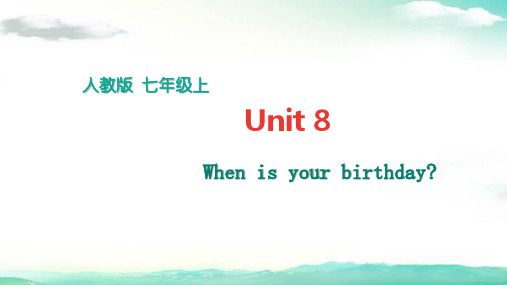
D__e_ce_m__b_e_ris the twelfth _m__o_n_th___ of the year. 36.我的生日在5月2日。 My birthday is ____o_n___ ___M__a_y__ __s_e_co_n__d_. 37.请五月份来吧! Please come ___in_____ __M__a_y___!
人教版 七年级上
Unit 8
When is your birthday?
第一课时 Section A(1a~1c)
March
January
June
December November
May
September July
April August
October February
October first January first
第二课时 Section A(2a~2e)
一、写出下列基数词的序数词形式。(10×2分=20分)
1.three__t_h_ir_d___
2.five___f_i_ft_h__
3.eight__ei_g_h_t_h__
4.nine__n_i_n_t_h__
5.six__si_x_t_h___
6.twelve_t_w_e_l_ft_h__
___T_o_m__'s_ birthday ___i_s_n_'t__ on June _n_in_e_t_e_e_n_t.h 30.——你多大了? ——我12岁。
—___H_o_w___ ___o_ld____ are you?
英语人教七年级上册 Unit 8 When is your birthday PPT课件

activities
opinions
on September a school trip I think it's exciting.
21st
• Four students work in a group. • One student fill in the chart, the
other students give ideas. • The group leader make the report.
Post-reading: Retell(复述) the notice
Dear students, We have some interesting and fun things for you this term.
Dates
Activities
on September 21st a school trip
5. Are the students very busy? Yes, they are. Do you think they will have a good time this term? Why?
Yes, I think so. Because they have many interesting and fun things this term.
Unit 8 When is your birthday?
soccer game book sale
art festival school trip
Sports Day
School Day
English Day
party
美国人超级喜欢party, 但凡有机会就聚在一起欢乐。而且, 开party的理由五花八门, 主题和类型也多种多样, 例如: 游园会Garden Party 晚餐会Dinner Party 读书会Reading Party 茶话会Tea Party 钓鱼会Fishing Party 不论什么理由, 都可以举行一场Party。某一天, 当我们踏入 美国的国土进行游历之时, 面对完全陌生的party文化, 该如 何更好的融入他们,下面是美国常见聚会礼仪须知。
人教版七年级英语上册Unit 8 When is your birthday单元课件

at 9:00 in the morning
Grammar Focus
Notes: 物主代词和名词所有格都可表示“某人的……” 表示“在某日”,用介词“on”; 表示“在某月”,用介 词“in”
Grammar Focus
3a Match the questions and answers.
Questions: 女性 b 1. When is Jenny’s birthday? ___ d 2. When are their birthdays? 复数形式 ___ e 3. When is your brother’s birthday? ___ 特殊疑问句 ___ c 4. Is his birthday in July? ___ a 5. Is your birthday on 一般疑问句 February 1st? 是具体的日期
It’s ____ in August. 6. 是在八月份。______ 7. 爱丽丝的生日是什么时候? When is ______ _________? Alice’s Birthday 8. 她的生日在九月五日。 Her birthday is ____ on __________ September 5th. ____ 9. 你爸爸的生日是什么时候? When ___ is ______ your _________ father’s birthday? 10. 他的生日是在4月21日。 ____ birthday ________ is _____ His on ______ April 21st.
基数词 twenty-one twenty-two twenty-three twenty-four … thirty thirty-one …
七年级英语上册 Unit 8 When is your birthday(第1课时)教案 人教新目标版
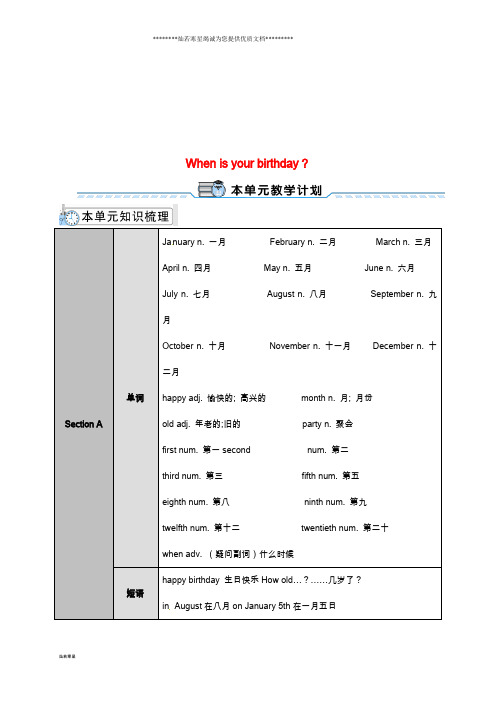
When is your birthday?Ja nuary n.inrip n.n.Day3. We have an Engl ish party on November 30th.知识目标 掌握when【课时建议】 本单元建议5课时Section A (1a~2e )………………………………………………………………1课时Section A (3a~3c )………………………………………………………………1课时Section A (1a~1d )………………………………………………………………1课时Section B (2a~2c ) ……………………………………………………………1课时Section B (3a~selfcheck )………………………………………………………1课时词汇短语:主要采用图片、作比较及在实际操作中运用的方法。
基本句子:采用多媒体展示及交际法。
语法:1. 基数词变序数词——歌诀助记法。
2. 时间介词on, in与at——归类法、歌诀助记法。
Section A 第1课时(1a~2e)your birthday, on May 2nd, happy birt hday, how old, this afternoon, see you1.什么时候when2. 月; 月份month他们准备什么时候回英国?—What time do they get here? 他们几时到这里?—At 9: 00 p. m. 晚上九点。
2. My birthday is on May 2nd. 我的生日是在5月2日。
on是介词,用于具体的某一天时间之前,即与星期、日期相关的时间之前。
例句:He is at home only on Sunday. 他只有星期天在家。
Simon’s birthday is on June 3rd. 西蒙的生日在6月3日。
辨析:on,at与inon 常用于“日期、星期”前,表示“在具体的某一天”on June 11th 在6月11日on Friday在星期五at常用于具体的钟点(某时某刻)前或某些固定短语中at 8:00在8点钟at night在晚上in常用于“月、年、季节”等时间前,也可用于一天中的上午、下午或晚上前in 2006 在2006 年in May在五月in winter在冬天in the morning 在早上3.September 5th 9月5日英语中日期的表示方法:(1)英式英语表达日、月、年:书写时,日期可以写成序数词,也可以只写基数词,但在读时一定要读成序数词,且加定冠词the。
人教版英语七年级上册Unit 8 知识点汇总和考点精讲
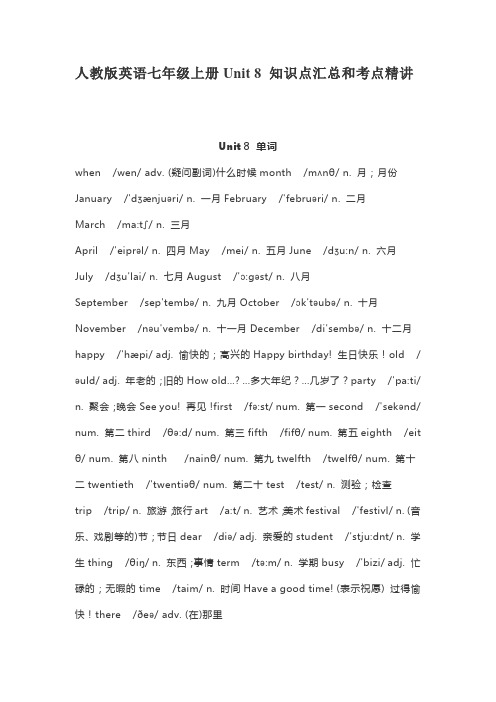
人教版英语七年级上册Unit 8 知识点汇总和考点精讲Unit 8 单词when /wen/ adv. (疑问副词)什么时候month /mʌnθ/ n. 月;月份January /'dʒænjuəri/ n. 一月February /'februəri/ n. 二月March /ma:tʃ/ n. 三月April /'eiprəl/ n. 四月May /mei/ n. 五月June /dʒu:n/ n. 六月July /dʒu'lai/ n. 七月August /'ɔ:gəst/ n. 八月September /sep'tembə/ n. 九月October /ɔk'təubə/ n. 十月November /nəu'vembə/ n. 十一月December /di'sembə/ n. 十二月happy /'hæpi/ adj. 愉快的;高兴的Happy birthday! 生日快乐!old /əuld/ adj. 年老的;旧的How old...? ...多大年纪?...几岁了?party /'pa:ti/ n. 聚会;晚会See you! 再见!first /fə:st/ num. 第一second /'sekənd/ num. 第二third /θə:d/ num. 第三fifth /fifθ/ num. 第五eighth /eit θ/ num. 第八ninth /nainθ/ num. 第九twelfth /twelfθ/ num. 第十二twentieth /'twentiəθ/ num. 第二十test /test/ n. 测验;检查trip /trip/ n. 旅游;旅行art /a:t/ n. 艺术;美术festival /'festivl/ n. (音乐、戏剧等的)节;节日dear /diə/ adj. 亲爱的student /'stju:dnt/ n. 学生thing /θiŋ/ n. 东西;事情term /tə:m/ n. 学期busy /'bizi/ adj. 忙碌的;无暇的time /taim/ n. 时间Have a good time! (表示祝愿) 过得愉快!there /ðeə/ adv. (在)那里02 知识梳理【重点短语】1. my father’s birthday我爸爸的生日2. happy birthday (to you) (祝你)生日快乐3. in August 在八月4. have a birthday party 举办一个生日派对5. have a book sale 举行一次书籍拍卖6. have an art festival 举办一次艺术节7. have an English party 举办一个英语派对8. have a basketball game 举办一场篮球赛9. School Day 学校开放日10. Teachers’ Day教师节11. Mother’s Day母亲节12. Women’s Day妇女节13. Sports Day 体育节14. two ball games 两场球赛15. this term 这学期16. in the afternoon 在下午17. on the 12th 在12日那天18. next month 下个月19. in the school library 在学校图书馆20. have a good time 玩得开心【重点句型】1. —When is your/his/her birthday? 你/他/她的生日是何时?—My/His/Her birthday is on November 11th. 我/他/她的生日是11月11日。
最新人教版七年级上册英语同步单元教案Unit 8

Unit 8When is your birthday?续表conversation together.3. Explain the difficulties.4. Let students read in pairs.5. Let six pairs of students role-play the conversation in the front of the class. quickly andaccording to thepicture beside it.2. Read theconversationtogether, then inpairs.3. Role-play it.意义的交际运用活动。
续表续表续表续表D. twelfth, twelve2. Mrs Green is mother.(C)A. Jim and KateB. Jim’s and Kate’sC. Jim and Kate’sD. Jim’s and Kate3. The baby is only .(A)A. ten months oldB. ten monthes oldC. ten month oldD. ten old months4. —When you have a school trip?—Sorry, I know. (D)A. are, don’tB. do, aren’tC. are, aren’tD. do, don’t5. March is the month of the year. (C)A. firstB. second续表Step 7 Consolidation 教师设置巩固检测练习:一、根据句意及汉语提示写单词。
1. Today is Linda’s birthday.She wants to have a birthdayparty (聚会) at home.2. They have two festivals (节日) this month.3. —Let’s go on a trip (旅行) tothe park.—That sounds great!4. Alice is very busy (忙碌)now, so she can’t go with us.5. —When do we have anEnglish test (测试), Bob?—This afternoon.二、连词成句。
人教版英语七年级上册Unit8 Section A (1a-2d) 课件
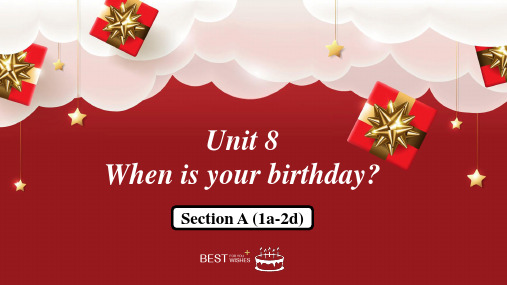
DItoisysoeut ktonocewlewbrhaatteisthe Cbihrrthistomf Jaesssuest.for?
Notes:表示具体的 某一天介词要用on
So when is Jesus’s birthday? -It’s on December 25th .
When is your birthday?
In August
[ɔːˈɡʌst]
, we have Army Day.
We have different festivals in different months.
In September , we have Teachers’ Day.
[sepˈtembə(r)]
We have different festivals in different months.
In April
['eɪprəl]
, we have April Fool’s Day.
We have different festivals in different months.
In May
[meɪ]
, we have Labor Day.
We have different festivals in different months.
January (Jan.) 一月 February (Feb.) 二月
May 五月
June (Jun.) 六月
September (Sept.) October (Oct.)
九月
十月
March (Mar.) 三 月
July (Jul.) 七月
November (Nov.) 十一月
April (Apr.) 四月
Module8Unit1课件七年级英语上册
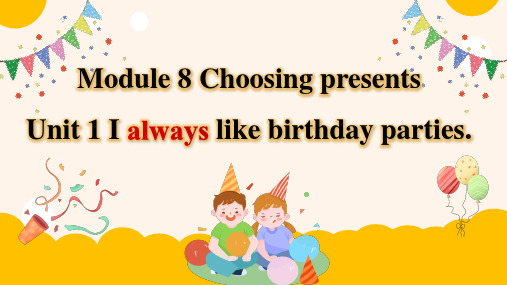
What
At his birthday party,what do Daming and his family do?
Listen and fill in the blanks
Who How often
What
usually
eats no_o_d_l_e_s and birthday cake
Excellent 优秀
Good 好
So so 一般
1.Recite the dialogue and remember the new vocabulary 2. Finish M8U1 in Exercise Book 3.Write a short passage about the celebration(庆祝) of your group members’ birthday.
Group work (小组合作)
Assessment 评价表
Items
Pronunciation发音
great (5 分)
not bad (3 分)
try harder (2 分)
Intonation语调
Content内容 Fluency流利
Total(总分)
Байду номын сангаас
___________in total.
Self-assessing 自我评估
At the end of the class, I can ( √ )
Items
1. understand the description of birthday celebration 2. understand the invitation expressed by Would you like to ...? 3.know how to use always/often/ usually/sometimes/never 4. Learn the impartance of choosing presents.
- 1、下载文档前请自行甄别文档内容的完整性,平台不提供额外的编辑、内容补充、找答案等附加服务。
- 2、"仅部分预览"的文档,不可在线预览部分如存在完整性等问题,可反馈申请退款(可完整预览的文档不适用该条件!)。
- 3、如文档侵犯您的权益,请联系客服反馈,我们会尽快为您处理(人工客服工作时间:9:00-18:30)。
d crayon
b scissors f toothbrush
e key
g trousers
h glasses
Listen to the dialogue and answer
the following questions 1. Who is talking to Ben? His mum. 2. What are they talking about? Whose things. 3. Who are mentioned(提及) in the dialogue? Mum, Dad, Ben and Linda.
A: Whose ball is this? B: It’s Ben’s ball. It’s his.
L
A: Whose crayons are these? B: They are Linda’s crayons. They’re hers.
A: Whose ball is this? B: It’s Ben’s ball. It’s his.
北师大版英语七年级(上册) Lesson 8 Whose Ball Is This?(1) 北京市长辛店第一中学 秦华
What’s the topic of Unit3? Home.
Ben
tidy his things
Guess
What are in Ben’s box?
What are in Ben’s box? Personal things.
L L B D D M
A: Whose crayons are these? B: They are Linda’s crayons. They’re hers.
假设你是Bob, 周末你和妈妈正在收拾 客厅。客厅里有很多东西。妈妈向你询问物 品的主人。 Family Dad, Mum, Bob, Amy members Things in toothbrush, keys, diary, the room glasses, scissors, towel, crayon, trousers
key /ki:/
crayon / ˈkreɪən /
scissors / ˈsɪzəz /
glasses / 'glɑ:sɪz /
diary / ˈdaɪəri /
towel / ˈtaʊəl /
trousers / ˈtraʊzəz /
toothbrush / ˈtu:θbrʌʃ /
Read the speaker. Key words: Personal things
crayon, diary, glasses, key, scissors,
toothbrush, towel, trousers
Read them together. Check in Pairs.
Say these words.
Look at the key words and label the items.
Key words: crayon, diary, glasses, key, scissors, toothbrush, towel, trousers
a towel
c diary
Listen to the dialogue and read aloud.(On Page 100)
Mum: Ben, whose things are these? Ben: This ball is mine and those shoes are mine,too. Mum: What about that diary ? Is it yours ? Ben: No, Mum. That’s Linda’s. I haven’t got a diary. And those are Linda’s crayons. Mum: Are the scissors hers, too? Ben: No, they’re dad’s. Well, I think they’re his. Maybe I’m wrong. Mum: Yes, they are. And the keys are his, too. But what about these glasses? Ben: They aren’t mine. These are girl’s glasses. Mum: Oh, sorry. They’re mine .
What things are mentioned(提到)? Tick them. √
crayons a diary
glasses keys scissors
√ √ √ √ √ √ √
a toothbrush shoes a ball
Do exercises2 on page 52.
Share in Pairs.
This ball is mine and those shoes are mine,too. my ball my Is it yours ? shoes your diary Are the scissors hers, too? her scissors I think they’re his. his scissors
Eg: A:Whose toothbrush is this? B: It’s Amy’s. The crayon is hers, too.
Homework
1. 听录音朗读第100页对话3遍。 2. A 组单词抄写背诵Key words。 B组在作业本上完成Activity 2的对话。 C组在作业本上将Activity 2写成短文。
Check the answers. It’s Ben’s ball. They are Linda’s crayons.
L L B D D M
What may (可能)happened before the dialogue? Why?
A. Go shopping.
B. Move to a new house.
